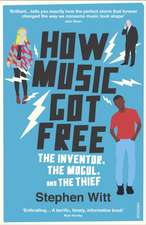Popular Music in a Digital Music Economy: Problems and Practices for an Emerging Service Industry: Routledge Research in Music
Autor Tim Andersonen Limba Engleză Hardback – 13 ian 2014
| Toate formatele și edițiile | Preț | Express |
|---|---|---|
| Paperback (1) | 256.32 lei 6-8 săpt. | |
| Taylor & Francis – 14 oct 2024 | 256.32 lei 6-8 săpt. | |
| Hardback (1) | 1054.97 lei 6-8 săpt. | |
| Taylor & Francis – 13 ian 2014 | 1054.97 lei 6-8 săpt. |
Din seria Routledge Research in Music
-
 Preț: 311.41 lei
Preț: 311.41 lei -
 Preț: 324.89 lei
Preț: 324.89 lei -
 Preț: 312.81 lei
Preț: 312.81 lei -
 Preț: 325.30 lei
Preț: 325.30 lei - 9%
 Preț: 935.57 lei
Preț: 935.57 lei -
 Preț: 312.28 lei
Preț: 312.28 lei -
 Preț: 290.00 lei
Preț: 290.00 lei -
 Preț: 383.06 lei
Preț: 383.06 lei - 19%
 Preț: 223.07 lei
Preț: 223.07 lei -
 Preț: 438.05 lei
Preț: 438.05 lei - 23%
 Preț: 256.32 lei
Preț: 256.32 lei -
 Preț: 463.62 lei
Preț: 463.62 lei - 18%
 Preț: 1000.45 lei
Preț: 1000.45 lei -
 Preț: 416.22 lei
Preț: 416.22 lei - 21%
 Preț: 257.49 lei
Preț: 257.49 lei - 18%
 Preț: 1000.27 lei
Preț: 1000.27 lei - 13%
 Preț: 310.55 lei
Preț: 310.55 lei -
 Preț: 324.68 lei
Preț: 324.68 lei - 18%
 Preț: 998.71 lei
Preț: 998.71 lei - 18%
 Preț: 894.39 lei
Preț: 894.39 lei -
 Preț: 312.14 lei
Preț: 312.14 lei -
 Preț: 489.26 lei
Preț: 489.26 lei - 18%
 Preț: 1002.99 lei
Preț: 1002.99 lei - 18%
 Preț: 1050.09 lei
Preț: 1050.09 lei -
 Preț: 437.55 lei
Preț: 437.55 lei - 18%
 Preț: 1119.87 lei
Preț: 1119.87 lei -
 Preț: 388.72 lei
Preț: 388.72 lei -
 Preț: 389.22 lei
Preț: 389.22 lei - 31%
 Preț: 765.03 lei
Preț: 765.03 lei -
 Preț: 420.08 lei
Preț: 420.08 lei - 18%
 Preț: 1003.93 lei
Preț: 1003.93 lei -
 Preț: 391.14 lei
Preț: 391.14 lei - 18%
 Preț: 834.72 lei
Preț: 834.72 lei
Preț: 1054.97 lei
Preț vechi: 1286.54 lei
-18% Nou
Puncte Express: 1582
Preț estimativ în valută:
201.89€ • 219.23$ • 169.59£
201.89€ • 219.23$ • 169.59£
Carte tipărită la comandă
Livrare economică 22 aprilie-06 mai
Preluare comenzi: 021 569.72.76
Specificații
ISBN-13: 9780415890632
ISBN-10: 0415890632
Pagini: 212
Ilustrații: 1 black & white illustrations, 1 black & white line drawings
Dimensiuni: 152 x 229 x 18 mm
Greutate: 0.46 kg
Ediția:New.
Editura: Taylor & Francis
Colecția Routledge
Seria Routledge Research in Music
Locul publicării:Oxford, United Kingdom
ISBN-10: 0415890632
Pagini: 212
Ilustrații: 1 black & white illustrations, 1 black & white line drawings
Dimensiuni: 152 x 229 x 18 mm
Greutate: 0.46 kg
Ediția:New.
Editura: Taylor & Francis
Colecția Routledge
Seria Routledge Research in Music
Locul publicării:Oxford, United Kingdom
Public țintă
Academic and PostgraduateCuprins
Introduction 1. Enter The End User: A New Audience for A New Media 2. Why Don’t We Give it Away?: The Value of Free for a New Music Industry 3. Retail Climate Change: From Selling Music to Selling a Service 4. Opening Pandora’s Box: The Problematic Promise of Radio on the Internet 5. Radio on the TV: Music Supervision Taken Seriously 6. In a Land of 360 deals a 1,000 True Fans Can’t Be Wrong: Financing the Social Musician and Online Relationships Conclusion
Recenzii
"Anderson’s book is a great guide for this new world. In his book, he draws on a wide range of examples from Moby and Lupe Fiasco to Amanda Palmer and Jonathan Coulton. He also introduces readers to the role that music supervisors, such as Alexandra Pastavas, are playing in film and television." --Richard Schur, Drury University, New Books in Music
Notă biografică
Tim J. Anderson is an Assistant Professor in the Department of Communication and Theater Arts at Old Dominion University, US.
Descriere
In the late 1990s, the MP3 became the de facto standard for digital audio files and the networked computer began to claim a significant place in the lives of more and more listeners. The dovetailing of these two circumstances is the basis of a new mode of musical production and distribution where new practices emerge. This book is not a definitive statement about what the new music industry is. Rather, it is devoted to what this new industry is becoming by examining these practices as experiments, dedicated to negotiating what is replacing an "object based" industry oriented around the production and exchange of physical recordings. In this new economy, constant attention is paid to the production and licensing of intellectual property and the rise of the "social musician" who has been encouraged to become more entrepreneurial. Finally, every element of the industry now must consider a new type of audience, the "end user", and their productive and distributive capacities around which services and musicians must orient their practices and investments.











